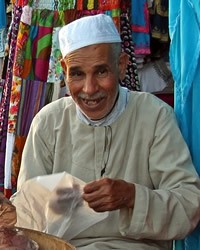Arab, Moroccan in Spain

Photo Source:
Monica Volpin - Pixabay
|
Send Joshua Project a map of this people group.
|
| People Name: | Arab, Moroccan |
| Country: | Spain |
| 10/40 Window: | No |
| Population: | 799,000 |
| World Population: | 31,513,800 |
| Primary Language: | Arabic, Moroccan |
| Primary Religion: | Islam |
| Christian Adherents: | 0.10 % |
| Evangelicals: | 0.05 % |
| Scripture: | New Testament |
| Ministry Resources: | Yes |
| Jesus Film: | Yes |
| Audio Recordings: | Yes |
| People Cluster: | Arab, Maghreb |
| Affinity Bloc: | Arab World |
| Progress Level: |
|
Introduction / History
The early Islamic period was a time when "Arab identity" meant that all Arabs had descended from a common male ancestor in the Arabian Peninsula. From there, Arabs gradually migrated through the Levant region and North Africa. Over the centuries, the Arabs in North Africa (especially in Morocco) have intermingled with Berbers, the original inhabitants. Thus, Moroccan Arabs are much less culturally “Arab” than those from the Arabian Peninsula.
Arabs, both those who are from the original homeland and those from North African countries like Morocco, have migrated to European countries for better jobs. Though they usually wind up in northern European countries, some remain in Spain. That is especially true of the Moroccans. Spain controlled most of Morocco as a colony at one time. As often happens with former colonial nations, the colonized people are allowed to go to the colonizing country as cheap labor.
Spain liberalized their laws regarding foreign workers in 2000, which accelerated the number of Moroccan Arabs coming there for work. At other times the Spanish have convinced Moroccans to return to their country. Moroccans are the largest foreign community in Spain today.
What Are Their Lives Like?
For most of the Diaspora Arabs, there have been a greater variety of job opportunities. This has greatly aided their need to climb out of poverty. However, it has also weakened their traditional family ties. In Spain, there is greater freedom for Moroccan women to leave the home, fewer arranged marriages, and less social pressure to conform to traditional religious practices.
What Are Their Beliefs?
It was early in the seventh century that Mohammed first preached the tenets of Islam to the Arabs. His successors quickly spread the word of Allah far and wide. Wherever Arabs went, they left elements of their Arab culture, including their religion. The historical link between Arabs and the Islamic religion is still very strong. Today, most Arabs are Muslims, belonging to several sects: the Shia ("Ithna Ashari" or "Ismaeli"), the Alawi, the Zaidi, and the Sunni. Sunni Muslims are the majority group.
The Islamic influence on Moroccan culture has resulted in a less pure form of Islam since it was blended with indigenous religions. However, all religion is often downplayed in Europe's secular environment.
What Are Their Needs?
Moroccan Arabs in Europe need better education so they can advance economically. This means mastering the local language and learning to fit into a European culture.
Prayer Points
Ask the Lord to call people who are willing to reach out with the love of Christ to Moroccan Arabs in Europe.
Pray that God will raise up faithful intercessors who will stand in the gap for Moroccan Arabs.
Ask God to strengthen, encourage and protect the small number of Moroccan Arabs who have decided to follow Christ.
Pray that the softening of their traditional culture will create open doors for the gospel to spread from one Moroccan Arab family to another.
Ask the Holy Spirit to soften the hearts of Moroccan Arabs to the teachings and the ways of Jesus Christ.
Ask the Lord to raise up strong local fellowships among Diaspora Moroccan Arabs in Spain.